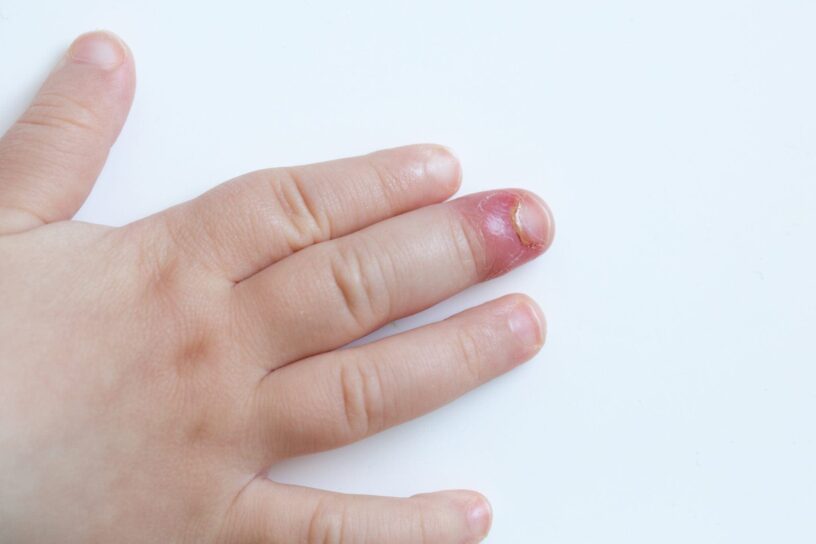Paronychia Treatment Market was valued at USD 464.60 million in 2022 and is expected to grow at a CAGR of 7.2% during the forecast period.
The Paronychia Treatment Market focuses on the treatment of paronychia, a common nail infection that affects the skin around the nails, typically caused by bacteria or fungi. Paronychia can be acute or chronic, with acute cases often resulting from injury or trauma to the nail area, while chronic paronychia is usually linked to ongoing irritation or fungal infections. Effective treatment is crucial to prevent complications such as abscesses or nail deformities, which can arise if the condition is left untreated. The market for paronychia treatment is driven by an increasing incidence of skin and nail infections, along with advancements in topical and oral therapies.
Key Components and Market Drivers:
- Types of Treatments:
- Antibiotic Therapy: For acute bacterial paronychia, oral or topical antibiotics are the first line of treatment. Commonly prescribed antibiotics include clindamycin, cephalexin, and amoxicillin-clavulanate, which target bacterial infections caused by Staphylococcus aureus and Streptococcus species. In more severe cases, surgical drainage may be required if abscesses form.
- Antifungal Therapy: Chronic paronychia is often caused by fungal infections, particularly Candida species. Topical antifungal creams such as clotrimazole, miconazole, and nystatin are used to treat fungal paronychia. In more persistent cases, oral antifungal medications like fluconazole or itraconazole may be prescribed.
- Anti-inflammatory Treatment: Chronic paronychia associated with prolonged irritation or inflammation is treated with topical corticosteroids to reduce swelling and redness. These are often combined with antifungal treatments to manage mixed infections.
- Home Remedies and Preventive Measures: Mild cases of paronychia can sometimes be managed with warm soaks, proper nail hygiene, and avoiding irritants like water or chemicals. However, if the condition persists or worsens, medical intervention is required.
- Market Drivers:
- Increasing Incidence of Paronychia: Factors such as frequent nail biting, improper manicures, and prolonged exposure to water and chemicals are contributing to a rise in cases of paronychia. Occupations such as healthcare, food handling, and cleaning, where hands are frequently exposed to moisture, are particularly at risk of developing chronic paronychia.
- Growing Awareness About Nail and Skin Health: Rising awareness about the importance of nail care and skin health is leading to more individuals seeking treatment for paronychia and related conditions. This trend is supported by educational campaigns promoting hygiene and proper nail care practices to prevent infections.
- Advancements in Topical and Oral Treatments: The development of new and more effective topical antibiotics and antifungal treatments is contributing to market growth. Improved formulations, such as combination therapies that address both bacterial and fungal infections, are enhancing treatment outcomes and patient compliance.
- Rising Dermatological Consultations: As people become more conscious of their appearance and health, there is an increase in dermatological consultations for skin and nail conditions, including paronychia. This trend is particularly strong in urban areas where access to healthcare is easier, and individuals are more aware of available treatments.
- Competitive Landscape and Market Trends:
- Key Players: Pharmaceutical companies and dermatology-focused firms are involved in the development and distribution of treatments for paronychia. Key players include:
- Pfizer Inc.: Known for its broad range of antifungal and antibiotic products, Pfizer offers both oral and topical treatments commonly used for managing paronychia.
- GlaxoSmithKline (GSK): GSK produces a variety of topical creams and ointments used to treat skin infections, including those associated with paronychia.
- Bayer AG: This company provides antifungal treatments such as clotrimazole, which are widely used in the treatment of chronic fungal paronychia.
- Teva Pharmaceutical Industries: Teva manufactures generic antibiotic and antifungal medications commonly prescribed for the treatment of paronychia.
- Market Trends:
- Rise in OTC Products: Over-the-counter (OTC) topical treatments, such as antifungal and antibiotic creams, are increasingly popular for managing mild cases of paronychia. These products are easily accessible, making it convenient for patients to treat infections in their early stages.
- Combination Therapies: The trend toward using combination therapies (e.g., an antibiotic combined with a corticosteroid or antifungal) is growing, especially for chronic paronychia cases where multiple pathogens or factors may be involved.
- Focus on Preventive Care: Preventing paronychia through better hygiene, nail care products, and protective measures (e.g., wearing gloves) is becoming a focus, particularly in industries where workers are prone to chronic paronychia due to frequent exposure to irritants.
- Teledermatology Services: The rise of telemedicine, especially teledermatology, is enabling patients to seek prompt advice and treatment for skin and nail infections, including paronychia. This has improved access to care, especially during early stages of infection, preventing progression to more severe forms of the condition.
- Key Players: Pharmaceutical companies and dermatology-focused firms are involved in the development and distribution of treatments for paronychia. Key players include:
Conclusion:
The Paronychia Treatment Market is experiencing steady growth driven by the increasing incidence of skin and nail infections, greater awareness of nail health, and advancements in topical and oral therapies. Innovations in combination treatments, along with the rise of telemedicine and OTC solutions, are making it easier for patients to access effective care. With a growing focus on preventive care and early intervention, the market is expected to expand, particularly in regions with high rates of occupational exposure and urbanization. As healthcare providers emphasize the importance of proper nail care and hygiene, demand for paronychia treatments is likely to continue rising.
Click Here, To Get Free Sample Report https://stringentdatalytics.com/sample-request/paronychia-treatment-market/13967/
Market Segmentations:
Global Paronychia Treatment Market: By Company
GlaxoSmithKline
Glenmark Generics
Teva Pharmaceutical Industries
Eli Lilly
Jonakayem Pharma Formulation
Fougera Pharmaceuticals
Taro Pharmaceutical Industries
Global Paronychia Treatment Market: By Type
Mupirocin Ointment
Fusidic Acid Ointment
Gentamicin Ointment
Dicloxacillin
Global Paronychia Treatment Market: By Application
Hospital Pharmacy
Retail Pharmacy
Online Pharmacy
Global Paronychia Treatment Market: Regional Analysis
The regional analysis of the global Paronychia Treatment market provides insights into the market’s performance across different regions of the world. The analysis is based on recent and future trends and includes market forecast for the prediction period. The countries covered in the regional analysis of the Paronychia Treatment market report are as follows:
North America: The North America region includes the U.S., Canada, and Mexico. The U.S. is the largest market for Cold-chain Pharma in this region, followed by Canada and Mexico. The market growth in this region is primarily driven by the presence of key market players and the increasing demand for the product.
Europe: The Europe region includes Germany, France, U.K., Russia, Italy, Spain, Turkey, Netherlands, Switzerland, Belgium, and Rest of Europe. Germany is the largest market for Cold-chain Pharma in this region, followed by the U.K. and France. The market growth in this region is driven by the increasing demand for the product in the automotive and aerospace sectors.
Asia-Pacific: The Asia-Pacific region includes Singapore, Malaysia, Australia, Thailand, Indonesia, Philippines, China, Japan, India, South Korea, and Rest of Asia-Pacific. China is the largest market for Cold-chain Pharma in this region, followed by Japan and India. The market growth in this region is driven by the increasing adoption of the product in various end-use industries, such as automotive, aerospace, and construction.
Middle East and Africa: The Middle East and Africa region includes Saudi Arabia, U.A.E, South Africa, Egypt, Israel, and Rest of Middle East and Africa. The market growth in this region is driven by the increasing demand for the product in the aerospace and defense sectors.
South America: The South America region includes Argentina, Brazil, and Rest of South America. Brazil is the largest market for Cold-chain Pharma in this region, followed by Argentina. The market growth in this region is primarily driven by the increasing demand for the product in the automotive sector.
Click Here, To Buy Premium Report https://stringentdatalytics.com/purchase/paronychia-treatment-market/13967/?license=single
About Stringent Datalytics
Stringent Datalytics offers both custom and syndicated market research reports. Custom market research reports are tailored to a specific client’s needs and requirements. These reports provide unique insights into a particular industry or market segment and can help businesses make informed decisions about their strategies and operations.
Syndicated market research reports, on the other hand, are pre-existing reports that are available for purchase by multiple clients. These reports are often produced on a regular basis, such as annually or quarterly, and cover a broad range of industries and market segments. Syndicated reports provide clients with insights into industry trends, market sizes, and competitive landscapes. By offering both custom and syndicated reports, Stringent Datalytics can provide clients with a range of market research solutions that can be customized to their specific needs.
Contact Us
Stringent Datalytics
Contact No- +1 346 666 6655
Email Id- sales@stringentdatalytics.com




Leave a Reply